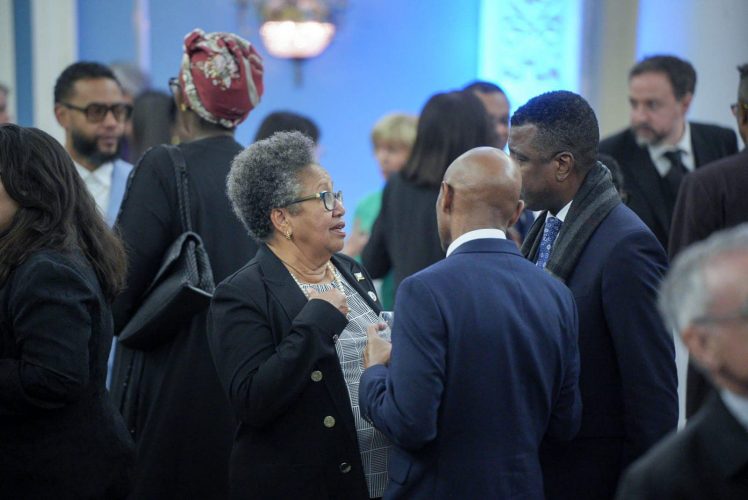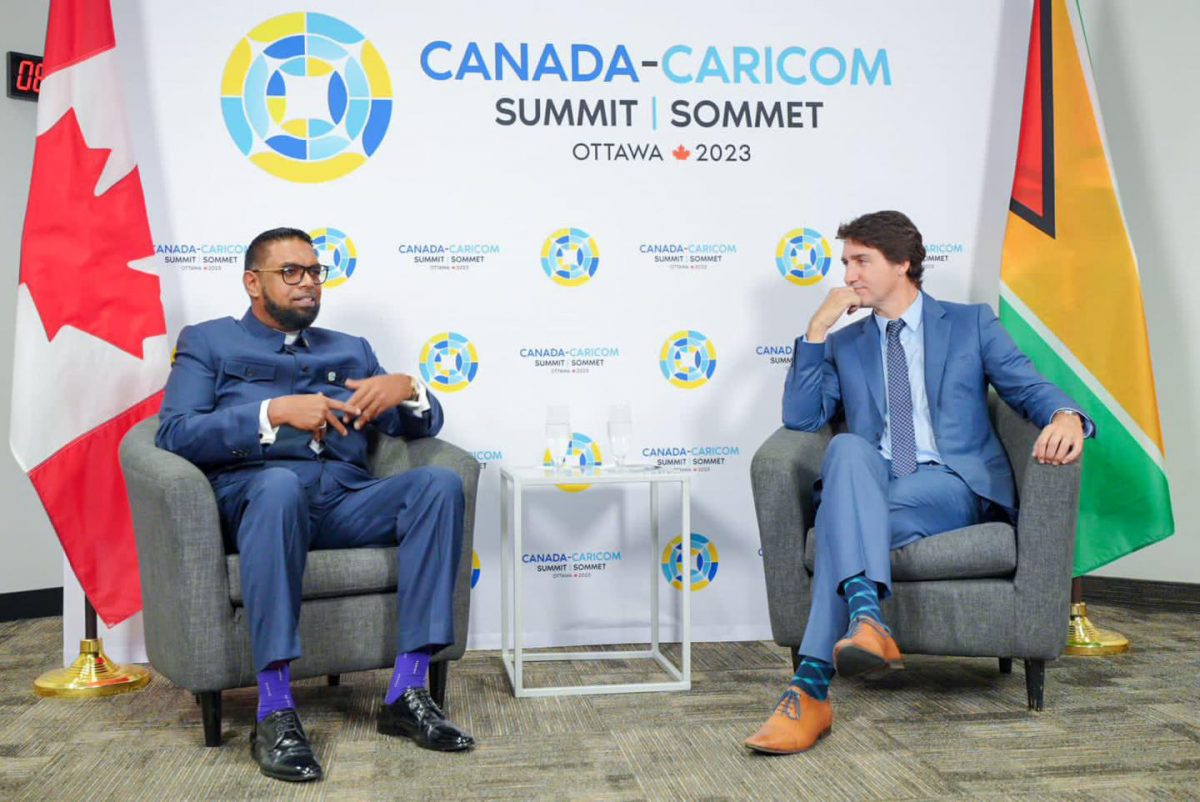Meeting for the first time in Ottawa, CARICOM and Canada yesterday launched a strategic partnership with the promise of joint action on security, climate and the crisis in Haiti.
The communique issued after the two-day meeting pledged action on a range of issues.
“Together we commit to joint action on shared priorities such as climate resilience; building inclusive and sustainable economies; enhancing multilateral cooperation; and bolstering bilateral and regional security, including working together to help restore the security and stability of Haiti for the benefit of its people”, the communique said.

The two sides also agreed to work on promoting gender and racial equality and inclusion in the hemisphere, and to strengthening the “already deep people-to-people ties”.
Achieving the United Nations’ sustainable development goals (SDGs) and building strong, resilient and inclusive societies and economies are also matters on the agenda of the two sides.
Several mechanisms were outlined to breathe life into the partnership.
The communique said that the partnership serves as a permanent joint mechanism for regular dialogue, as well as for ad hoc consultations on issues of mutual interest.
Global Affairs Canada and the CARICOM Secretariat will co-lead the general coordination and management of the Strategic Partnership.
The Canada-CARICOM Strategic Partnership will see regular leader-level engagement to set overarching priorities and interests to advance and further deepen the partnership in addition to concurrent formal and ad hoc for a.
The Canada-CARICOM Foreign Ministers’ Group (CCFMG) will meet annually to advance overarching priorities through substantive discussions on issues impacting the Caribbean region and the hemisphere, emerging trends and solutions to common challenges.
Based on the agenda and discussions during the CCFMG, Ministers will set annual priorities for officials to guide the implementation of a Canada-CARICOM roadmap for action, the communique said.
Ad-hoc ministerial-level meetings will also be held to advance specific thematic priorities, including on Trade, Development, Finance, Health, Environment, and Defence, etc.
Ad-hoc expert dialogues between relevant Canadian and CARICOM institutions could be established to advance thematic priorities and actions listed in the Canada-CARICOM Roadmap. Expert groups would meet before and after major international summits.
Capacity building and technical assistance are also on the agenda to deepen institutional linkages through training, knowledge exchange, capacity building and technical assistance initiatives. An exchange programme wound also be developed where a CARICOM official is embedded in a federal organisation and vice-versa in the Secretariat or within a CARICOM Member State’s organisation.
Meanwhile, President Irfaan Ali on Wednesday evening said that Canada and CARICOM must now focus on working together in addressing matters such as climate change and regional security.
His statement came during a reception held at the inaugural Canada-CARICOM Summit.
“With what is happening in Haiti and in the Palestine region, this is a time for us as leaders who give a helping hand to other brothers and sisters in Haiti and the Palestine region and also a time for us to focus on how we can promote regional security” the Guyanese Head of State told the gathering at the reception”.
Ali said that he is happy for the summit co-chaired by Canadian Prime Minister Justin Trudeau as it presented the opportunity for global leaders to brainstorm a gamut of ideas that can be utilized to address the challenges which lie ahead.
“These discussions entailed climate change and resilience, access to finance, reforming the global financial outline and regional security and a special emphasis on the situation with Haiti,” he said.
Ali also said that he is currently engaging the Canadian Prime Minister on how the two countries can enhance bilateral relations and work collaboratively in the best interest of its peoples.
Yesterday, at the culmination of the summit Trudeau asserted at a closing press conference that the launch of the Canada-CARICOM strategic partnership will foster the existing relationship between the North American country and Caribbean associated members through regular leader, ministerial and senior official level meetings to advance time-bound and agreed-upon roadmaps for action.
“It is a pleasure having President Irfaan Ali, Prime Minister Keith Rowley and other CARICOM leaders here as this launched partnership serves as a permanent joint mechanism for regular dialogue, as well as for ad hoc consultations on issues of mutual interest, with responsibility for preparation, follow-up and implementation of joint actions, decisions and agreements…”, the Canadian Prime Minister said.
Illegal firearms
Meanwhile, Prime Minister Rowley of Trinidad and Tobago, weighing in on the surge of gang violence in Haiti, said that the uncontrolled use of illegal weapons has become a norm in many CARICOM countries.
“In recent times, we have seen an explosion in the use of illegal arms and ammunition on a daily basis. In fact, the data now shows that we are losing, by violent killings, about 15 people a day in the CARICOM region, nearly all of it from the use of firearms, and there is a proliferation in recent times of assault weapons, so the instance of shootings usually end up with multiple casualties and many deaths”, he lamented.
He also referenced instances whereas illegal firearms in the hands of criminals had worsened the risk to national security, especially in Trinidad and Tobago.
“Gangs have been arming themselves more efficiently and effectively, they have become better killing machines to the point now where they pose a threat to the state itself”, he said.
According to a Trinidad Guardian report “there were recent major firearms hauls in the community of Santa Cruz area” which Rowley referenced.
“Only last week in Trinidad and Tobago, by diligent police work, we discovered a cache of 35 50-calibre weapons in a village. When we thought that was the end of it, we discovered another dozen, so people are arming themselves to carry out their criminal business, largely the drug trade and human trafficking trade,” he said.
Rowley identified Canada’s role in improving Trinidad and Tobago’s and the region’s border security through the procurement of vessels.
We need to be better able to patrol our coastal areas with small craft and we can’t get a proper supply of small craft to put into use immediately. I am amazed at how difficult it is to get small craft, littoral zone patrolling, but Canada has a long coastline, you have good business and it may very well be that in conversation with your people, we might be able to find some assistance. We’re not just talking here about handouts; we’re talking about actually getting the equipment to help us patrol our littoral zones”, the PM said. Rowley added that the criminals have grown their ability faster than the police have been able to cope and called for help with improved police training.
The Prime Minister commenting on the current Israeli-Palestine conflict said that while the issue is a grave concern of global leaders it also serves as a lesson in relation to the prioritization of regional security and stability in several countries which may be vulnerable in the area of security.









